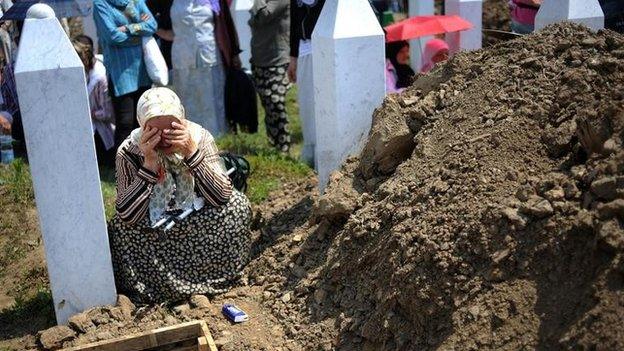Srebrenica massacre marked by Westminster Abbey service
- Published
More that 8,000 men and boys died at Srebrenica, as Bridget Kendall reports
Thousands of men and boys killed in the Srebrenica genocide 20 years ago have been remembered at a service at Westminster Abbey.
About 2,000 guests, including survivors, politicians and the President of Bosnia and Herzegovina were in attendance.
Munira Subasic, president of the Mothers of Srebrenica Association, spoke about the "inhuman atrocity".
The massacre in 1995 was the worst in Europe since World War Two.
'Give dignity'
President of Bosnia and Herzegovina, Bakir Izetbegovic, said the UK was "leading the way" in commemorating Srebrenica and praised the country for drafting a UN Security Council resolution to mark the 20th anniversary of the massacre.
"We cannot bring back the dead, nor extinguish pain from the hearts of their loved ones, but we can give dignity to the survivors of the Srebrenica genocide," he said.
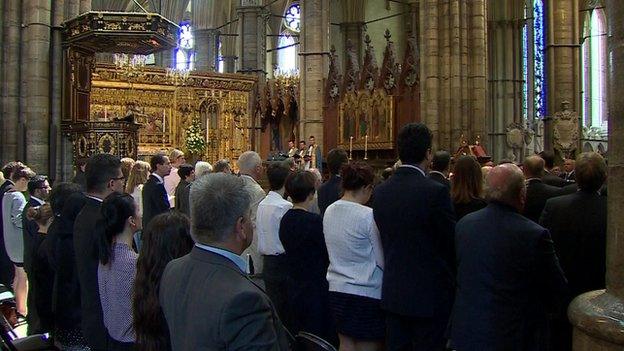
About 2,000 people attended the Westminster service
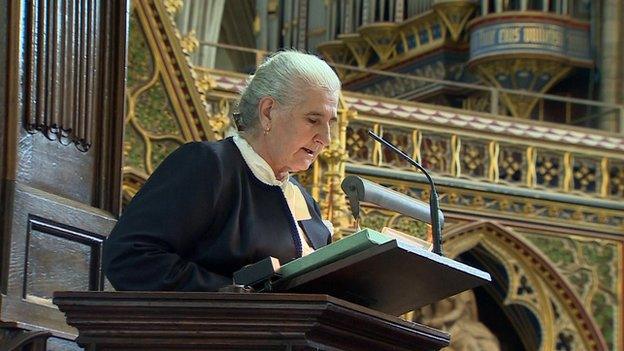
Munira Subasic lost several members of her family during the massacre at Srebrenica
Lord Ashdown, who became the European Union's High Representative for Bosnia and Herzegovina in 2002, told the congregation: "Whether through error, misjudgement, an inability to comprehend, or just inattention, we stood aside when we should not have done.
"We should therefore remember Srebrenica, not just to bear witness to those who suffered, but also as a warning to us all of what happens when we turn our back."
The genocide, which killed about 8,000 Bosnian Muslims, came amid the bloody break-up of Yugoslavia into independent states.
Serbia backed the Bosnian Serb forces fighting the Muslim-led Bosnian government during the conflict.
The atrocity took place a few months before the end of the Bosnian war, when 20,000 refugees fled to Srebrenica to escape Serb forces.
It was an enclave protected by UN Dutch soldiers but was overrun by paramilitary troops led by the Bosnian Serb commander Ratko Mladic in July 1995.
They rounded up and killed the men and boys, and buried them in mass graves.
'Doubles our determination'
Ms Subasic spoke "on behalf of thousands of mothers whose children were brutally murdered".
"Although it has been 20 years since this inhuman atrocity, some mothers are still searching for the bones of their children," she said.
"That is our life now - our biggest problem and our greatest mission."
She later told the BBC: "They took my son away from me and put him in a white house. Eighteen years after I only find two little bones and gave him a burial.
"I appeal upon all good people lets make things better while we still can, so that the criminals may be brought in front of justice to have their names as war criminals, just as our kids have their names as victims."
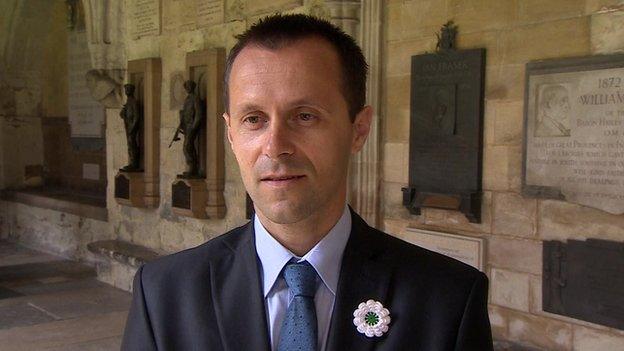
Mr Avdic said he was 17 years old when the shooting happened
Communities and Local Government Minister Greg Clarke gave an address on behalf of Foreign Secretary Philip Hammond, who was unable to attend the service.
He said the gathering to mark the 20th anniversary "doubles our determination never to forget".
"It demands that we all try to understand why those who placed their hope in the international community on the eve of genocide found that those hopes were dashed," he said.
Survivor Nedzad Avdic told the BBC how he was shot at and fell among a line of dead bodies.
"When they finished the shooting I prayed to die, because it was unbearable for me. I waited for dying," he said.
"I never thought I could save myself. I noticed someone move in the middle of the bodies. I asked him if he was alive. Within 10 minutes we were in the bushes."
'Agony continues'
The service, which was organised by the UK charitable initiative Remembering Srebrenica, was followed by a reception hosted by Prime Minister David Cameron at 10 Downing Street.
Speaker of the House John Bercow was also hosting a formal reception in the Houses of Parliament.
Mr Cameron said: "The 20th anniversary is a moment to remember the many thousands who lost their lives, to remember their families and the missing, and the fact that for so many - including the Mothers of Srebrenica - the agony continues every day, undimmed by the passage of time.
"We must reaffirm our determination to act to prevent genocide in the future."
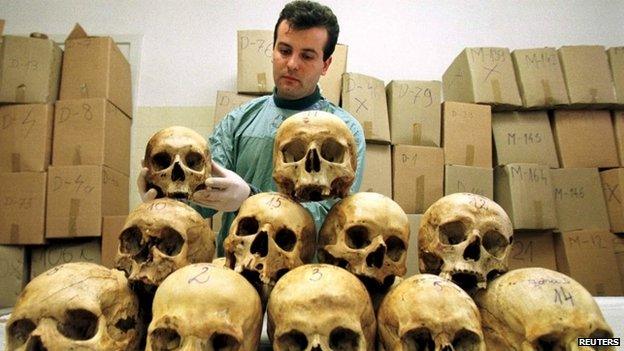
A pathologist examines skulls of victims taken from mass graves and wooded areas
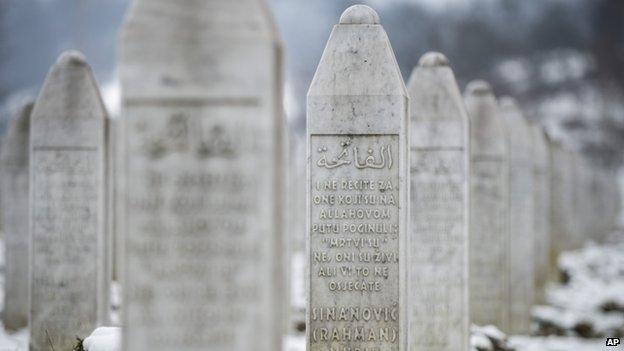
Many of the dead are remembered in the memorial cemetery of Potocari, outside Srebrenica
Gen Mladic, who was in charge of the Bosnian Serb troops at the time of the massacre, was on the run for 16 years before being arrested in 2011 in northern Serbia, where he had been living under an assumed name.
He is still on trial for war crimes at the UN tribunal in The Hague.
Meanwhile, in March, seven men were arrested by Serbian prosecutors on suspicion of taking part in the slaughter of more than 1,000 Muslims at a warehouse on the outskirts of Srebrenica.
The international tribunal at The Hague has already convicted numerous people of genocide in relation to the Srebrenica killings. But the arrests this year mean that for the first time such a case will be heard in Serbia.
Human remains are still being uncovered from the scene of the shootings, and some people have never had their relatives formally identified.
Across the UK about 100 events are being organised over coming days in memory of the genocide.
A commemorative event will be held on Wednesday in Cardiff, hosted by First Minister of Wales Carwyn Jones.
Scotland's First Minister Nicola Sturgeon will host a memorial service at St Giles' Cathedral in Edinburgh, on Friday.
The Princess Royal will represent the UK in Bosnia and Herzegovina on Saturday, which is Srebrenica Memorial Day.
People gathered at Belfast City Hall on Sunday to mark the start of Srebrenica Memorial Week.

Will you be attending a memorial service? You can share your experience by emailing haveyoursay@bbc.co.uk, external.
If you would be happy to speak further to a BBC journalist, please include a contact telephone number when emailing us your details.
Or WhatsApp us on +44 7525 900971
Send your pictures and videos to yourpics@bbc.co.uk, external, text them to 61124 (UK) or +44 7624 800 100 (international) or via our WhatsApp number +44 (0)7525 900971 .
You can also upload here, external.
- Published26 May 2015
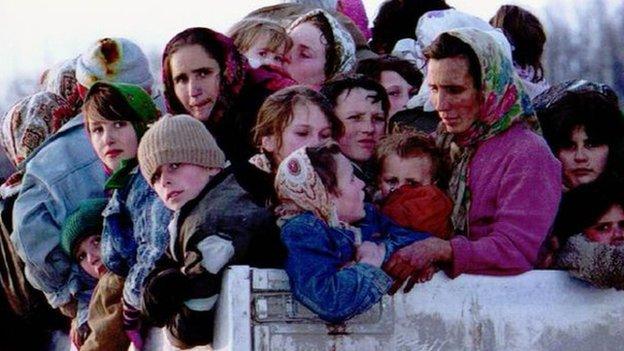
- Published19 June 2015
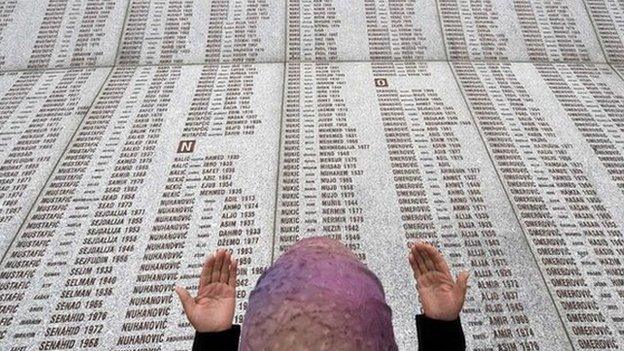
- Published18 March 2015
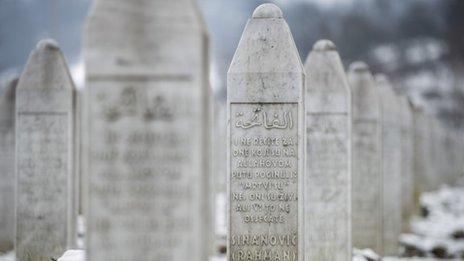
- Published30 January 2015
